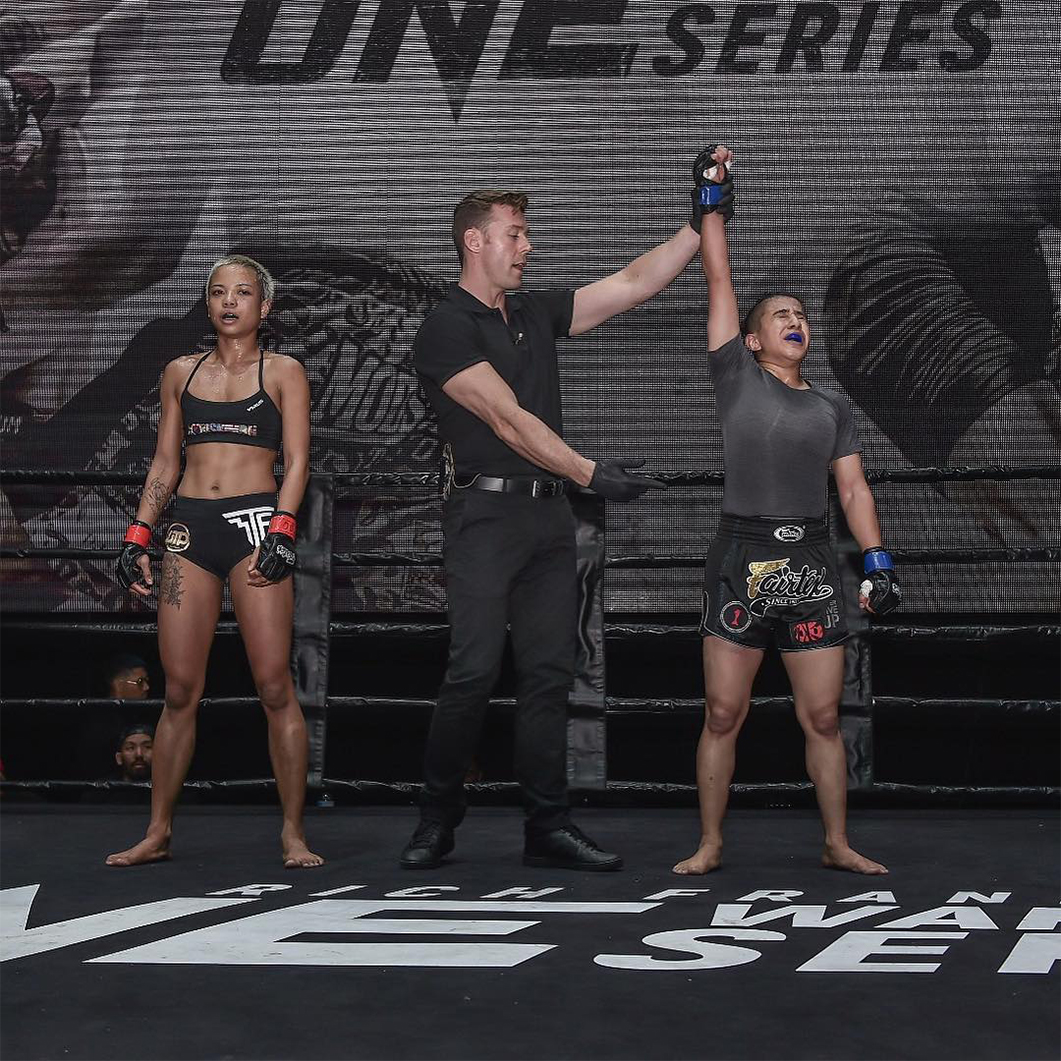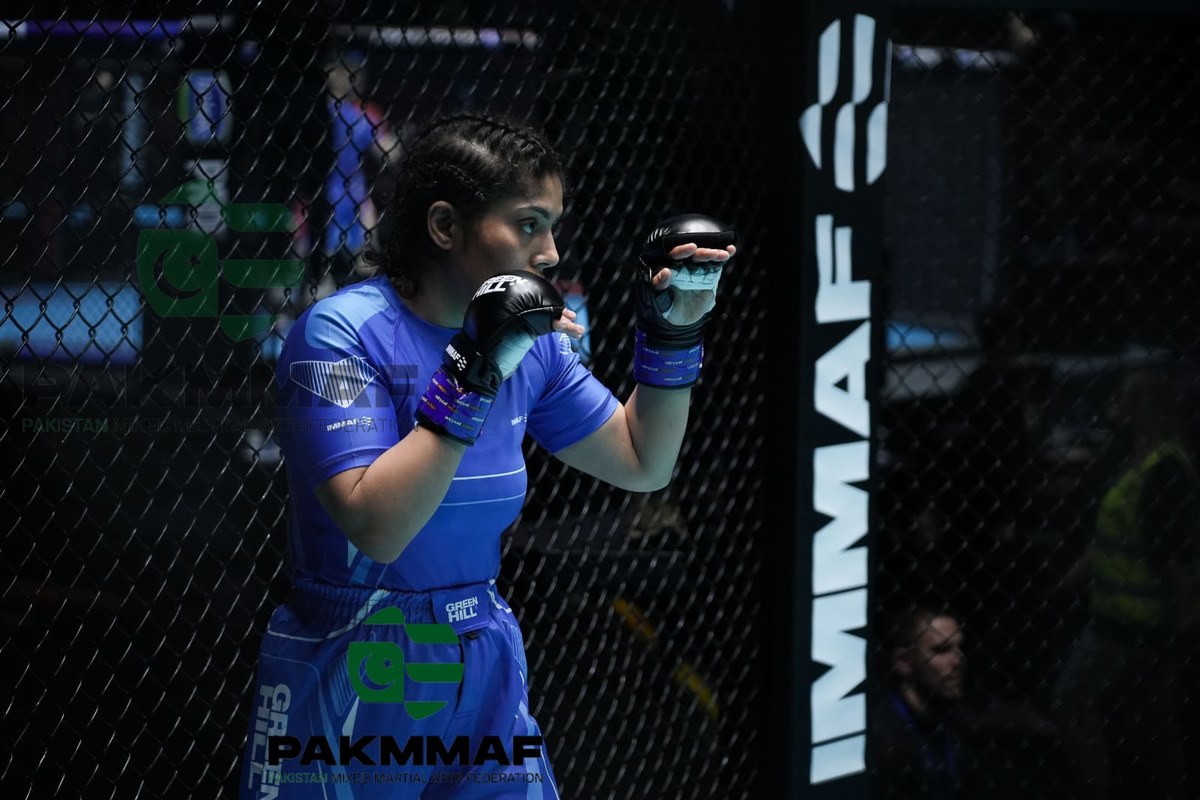ISLAMABAD: Mixed martial arts may have started as a male-dominated sport around the world, but women, including in Pakistan, are grappling their way to pursuing it as a full-time profession and representing their country internationally.
Meet Anita Karim, 26, the first international female MMA fighter from Pakistan, who got into the sport initially to learn self-defense but later turned her passion into a career choice.
MMA is a full-contact combat sport that combines boxing with wrestling, jujitsu, taekwondo, and other disciplines, both standing and on the ground. Fighters can attempt to knock out their opponents or force them to submit by using various submission holds. In recent years, MMA has gone from a perceived “blood sport” to mainstream global sports entertainment, and while it is yet to be adopted as an Olympic game, it is the world’s third most popular sport, behind football and basketball, according to Nielsen Sports DNA, a leading international analytics company.
Women’s MMA has been around since the 1990s but it was Olympic judo medalist Ronda Rousey’s signing in 2012 with the Ultimate Fighting Championship (UFC) that helped bring it to the general public.
Even Karim had to face resistance from society, and she had to reassure people that she could protect herself in a cage from punches, kicks, elbows, and chokeholds.
“I came to Islamabad from Hunza in 2016 and started training for MMA in 2017, mainly to learn self-defense techniques, but it gradually became a passion,” Karim said in an interview with Arab News.
“Initially, when I opted for it as a full-time profession, I had to listen to remarks about how MMA was a sport for boys. They would question whether I was capable of doing it or not and they used to say I should learn household chores instead, but I was determined that if I worked hard, I would get my desired results.”
Karim has participated in several national-level promotions and represented Pakistan three times at the Singapore-based ONE Fighting Championship, Asia’s largest MMA organization, included on Nielsen's list of the world's top 10 biggest sports media properties in terms of viewership and engagement.

The picture posted on May 9, 2019, shows Pakistani MMA fighter Anita Karim (right) at the Singapore-based ONE Fighting Championship. (Anita Karim/Facebook)
Karim has also participated in the Fairtex Fight Promotion in Bangkok twice.
“When I went abroad, people over there were initially surprised to see a female fighter from Pakistan. But now, a lot of girls are getting ready for their MMA careers and will be performing internationally in the near future,” Karim said.
The fighter said even if girls did not want to pursue MMA professionally, they should still learn self-defense techniques:
“Girls should not see self-defense as a leisure activity, but they must learn it to protect themselves in Pakistan … I request everyone, especially working women, to learn self-defense as it gives you confidence, and when you have confidence, you can handle all kinds of difficulties.”
Bushra Ahmad, 27, an amateur MMA fighter, said the sport had helped amplify qualities she already had.
“I had no plans to start it as a full-time career as I had casually joined a gym in 2018 for workout sessions, but I observed that whatever it takes to be an MMA fighter, I had that in me: I was confident, I was very disciplined, I was always on time on the mats, and I could take punches,” Ahmad, who represented Pakistan in the IMMAF World Championship in Serbia earlier this year, told Arab News.

The picture taken on February 14, 2023, shows Pakistani MMA fighter Bushra Ahmad during her International Mixed Martial Arts Federation (IMMAF) fight in Belgrade, Serbia. (Photo courtesy: Instagram/Bushra Ahmed)
In fact, she said, the sport chose her.
“I did not decide to choose MMA as a profession, it came to me as I was destined to be a fighter,” Ahmad said.
But despite her commitment to the sport, it has not been an easy ride.
“I have been asked a lot as to why I am doing this … how much am I earning from this profession, so that has been a challenge,” Ahmad said. “Besides, there are not many MMA gyms in Pakistan, there are very few female fighters, fewer events, and since I am from a higher weight category, it’s hard for me to find an opponent.”
But despite their passion, Karim and Ahmad both lamented that lack of governmental support was holding back many talented fighters like themselves and blocking the development of women’s MMA in Pakistan.
“There have been no facilities or help from the government to develop MMA in Pakistan, and so far, MMA has earned a name for itself in the country through self-help,” said Karim.
“Some of our top athletes need sponsorship because they are not financially strong, so they can’t manage it. In this way, our fighters are wasting their talent. If the government promotes MMA like cricket and helps the sport grow, we can produce lots of top athletes from Pakistan too.”
Shoaib Khoso, the director-general of the Pakistan Sports Board, did not respond to questions for this story but Babar Raja, the president of the Pakistan Mixed Martial Arts Federation (PMMAF) said most MMA events in the country were conducted and sponsored by non-profit associations like the PMMAF and the Mixed Martial Arts Pakistan (PAK MMA) group.
“Each year, the federation gives incentives to MMA fighters by organizing competitions for both men and women and we pay the winners Rs500,000 ($1,774) in each weight category to encourage them,” Raja told Arab News.
“Unfortunately, there is no help or support on the part of the government. In fact, people in power at the Pakistan Olympic Association, as well as the Pakistan Sports Board, take steps to discourage this sport, therefore, we have to rely on private sponsors.”
But Bashir Ahmad, the founder of PAK MMA group, said that the government’s involvement in the sport would only increase bureaucracy.
“I don’t think the government should be too involved, as even without any support from it, MMA in Pakistan has already grown step by step and at a pretty solid pace,” he said.
Both Ahmad and Raja, however. hoped more girls would come forward and join the sport."
“I think the future of Pakistani girls pursuing MMA as a full-time profession is very bright as it’s not only one of the fastest-growing sports in the world but is also one of the world’s highest-paying sports,” Raja said. “And while there are very few women fighters from Pakistan, they are becoming champions on both national and international levels, so more women should pursue this sport.”
Many of Karim and Ahmad’s male colleagues also advocated the need to encourage more women to join the sport.
“In my opinion, more women should learn self-defense as it could be a life-changing experience for them,” Shahzaib Ijaz, a male MMA fighter from Islamabad, said.
“That’s because at the end of the day, it’s your own responsibility to protect yourself, and that’s the message we try to give to women. People think it’s a male-oriented sport, but women also have hands and legs, so they can do it as well.”












